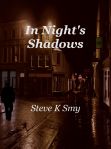I’m sure that most of us would like to consider ourselves to be open-minded. We’d probably be rather upset if we were accused of judging others by their appearance alone. In the world of books, however, three things operate to determine the initial success of works: the cover, the title and the blurb. Of course, in-store placement helps a little, by making sure that a book appears in the correct genre display area, so that it has an outside chance of being noticed. But, ultimately, most people are drawn in initially by the cover first, if it’s visible, then the title, and by the blurb once it’s in our hands. If only the spine is visible, then the title takes on primary importance.
So an author has to be lucky, or skillful, enough to be able to get the title of their work dead right. That’s not as easy as it sounds, though. Most books have a “working title” during the writing process, but a few actually start life as a title which will be the only definite thing about it. I know that I’ve had a title pop into my head and simply wait for a story to attach itself to it. In fact, I’ve several titles like that, and they’re currently still waiting!
The cover is something else. In traditional publishing, the author might have some idea of the kind of imagery they want, and a few might even create covers themselves, but generally the cover is produced via the publisher. With self-publishing, the author takes on the additional burden of finding the right cover, or creating it if they have the talent. Considering the importance of the cover, that’s a huge deal! A mistake here, and the potential reader’s eye will simply pass over it without even registering it.
Of the thousands of books that I’ve read, over many years, one thing has been noticeable. Blurb written by authors has declined. More and more have the blurb written by somebody working for the publisher. I would caution all authors against this practice! More and more blurb is written, evidently, by people who have either not read the book at all or have only scanned it without taking much of it in. I’ve too often encountered misleading or just downright inaccurate blurb. It doesn’t exactly say much for a book if the blurb writer didn’t even bother to read it. I admit that I hate writing blurb for one of my works. I sometimes put a lot of work into not making things obvious at the outset. Blurb, designed to finish the job started by the cover and title, can all too often be too revealing, giving away things that should be left to be discovered inside the book.
It would be wonderful if books could be judged purely on the contents, with no regard for title or cover, or blurb in some cases. After all, that’s where the real work has been done. If you buy a filled roll at a shop, you do so because you know that you like its contents. You’d never buy a roll from a shop again if the contents were everything you hate eating, even if the packaging suggested otherwise. You’d go back to a shop that sold honestly. Books, sadly, rely on the packaging because we’re not confident that genre is enough. We may describe ourselves as avid readers of, for example, fantasy novels, but we aren’t trusting enough to buy books purely because they are in that genre. Of course, there’s good reasons for that. Some books are placed incorrectly in genres that really don’t apply, or only do so in the loosest sense. A “fantasy” book that turns out to be erotic horror may be exactly what you don’t want to buy. The fact that the book should be under “erotic horror” and not “fantasy” is small compensation, once the money’s been spent.
Is there an easy solution to getting a book noticed for the author’s work, rather than that of some cover artist:? Can we persuade people to see beyond a title? Can we keep the suspense by not telling too much in the blurb? It’s difficult to see how. In fact, it’s harder now than it has ever been! In the modern world, it seems, packaging has become more important than content. There may come a time in a book’s life when the packaging isn’t so vital, because the book’s reputation is enough, but it has to be get to that point first.
It saddens me to say it, but the boldest, brashest, loudest packaging will always tend to sell better than the simple, honest, undemonstrative. There’s a feeling similar to that which attaches to differences in price. Two electronic gadgets displayed side by side. One is twice the price of the other. You’d be amazed at how often the more expensive product outsells the less, because people believe “you get what you pay for” means “the higher the price, the better the quality”. With books it becomes “the better the cover and title, the better the writing”. Both concepts are all too often false, but they seem to have become ingrained in our thinking.
Hopefully, the next time you’re browsing for books, you’ll be prepared to at least give as much prepurchase consideration to the apparently bland title and cover as you do the visually stunning.
~ Steve
52.057772
1.143786

